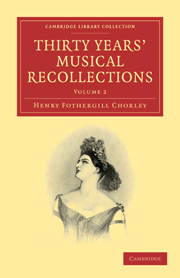Book contents
- Frontmatter
- Contents
- THE YEAR 1847
- THE YEAR 1848 (Her Majesty's Theatre.)
- THE YEAR 1848 (Royal Italian Opera.)
- THE YEAR 1849 (Her Majesty's Theatre.)
- THE YEAR 1849 (Royal Italian Opera.)
- THE YEAR 1850 (Her Majesty's Theatre.)
- THE YEAR 1850 (Royal Italian Opera.)
- THE YEAR 1851 (Her Majesty's Theatre.)
- THE YEAR 1851 (Royal Italian Opera.)
- THE YEAR 1852 (Her Majesty's Theatre.)
- THE YEAR 1852 (Royal Italian Opera.)
- THE YEAR 1853 (Royal Italian Opera.)
- THE YEAR 1854 (Royal Italian Opera)
- THE YEAR 1855 (Royal Italian Opera.)
- THE YEAR 1856 (Her Majesty's Theatre.)
- THE YEAR 1856 (Royal Italian Opera.)
- THE YEAR 1857 (Royal Italian Opera.)
- THE YEAR 1857 (Her Majesty's Theatre.)
- THE YEAR 1858 (Her Majesty's Theatre.—Royal Italian Opera.—Drury Lane.)
- THE YEAR 1859 (Royal Italian Opera.—Drury Lane.)
- The Last Chapter
THE YEAR 1852 (Her Majesty's Theatre.)
Published online by Cambridge University Press: 29 August 2010
- Frontmatter
- Contents
- THE YEAR 1847
- THE YEAR 1848 (Her Majesty's Theatre.)
- THE YEAR 1848 (Royal Italian Opera.)
- THE YEAR 1849 (Her Majesty's Theatre.)
- THE YEAR 1849 (Royal Italian Opera.)
- THE YEAR 1850 (Her Majesty's Theatre.)
- THE YEAR 1850 (Royal Italian Opera.)
- THE YEAR 1851 (Her Majesty's Theatre.)
- THE YEAR 1851 (Royal Italian Opera.)
- THE YEAR 1852 (Her Majesty's Theatre.)
- THE YEAR 1852 (Royal Italian Opera.)
- THE YEAR 1853 (Royal Italian Opera.)
- THE YEAR 1854 (Royal Italian Opera)
- THE YEAR 1855 (Royal Italian Opera.)
- THE YEAR 1856 (Her Majesty's Theatre.)
- THE YEAR 1856 (Royal Italian Opera.)
- THE YEAR 1857 (Royal Italian Opera.)
- THE YEAR 1857 (Her Majesty's Theatre.)
- THE YEAR 1858 (Her Majesty's Theatre.—Royal Italian Opera.—Drury Lane.)
- THE YEAR 1859 (Royal Italian Opera.—Drury Lane.)
- The Last Chapter
Summary
This year, at last, an Italian Opera season was gone through without a single female Italian singer.—But it was evident that the impending ruin of the theatre could not be averted much longer;—and that shifts and expedients, as reckless as they were fruitless, must needs be resorted to.
There was no novelty in music attempted, save “Casilda,” by H.R.H. the Duke of Saxe-Cobourg—creditable as amateur-composition, but no more. Indeed, though the dramas of Princess Amelia of Saxony, so cordially introduced to our public by Mr. Jameson, may in some manner be said to establish an exception, I doubt the feasibility of amateur stage-composition — amateur scaling of ladders to get into a sharply-fenced citadel—amateur running up the rigging on a stormy night—amateur resolution to do one of the hardest, most painful, of artistic tasks;—where the bad chances are as ten to one : where the caprices are infinite, where there are mire and sand to be waded through—where there is experience to be bought, by Time and Labour, and not by Influence or Gold.—What I said, in the case of Signor Mario's singing, of occasional grace and taste in interpretation, naturally fostered by refined habits—of a certain delicacy (to concede) in idea—has nothing to do with those processes of composition, of schooling, and (most important to one who will dare the arena of a theatre) of testing a man's power to move by its effects on folk unbiassed and unprejudiced;—on persons who come to the play to hear and to see;—and who, like the Miller in Scott's “Monastery,” when his daughter Mysie was engaged by the fine euphuism of Sir Piercie Shafton, will say, “Brave words—very brave words—very exceedingly pyet words—nevertheless, to speak my mind, a lippy of bran were worth a bushel o' them.”
- Type
- Chapter
- Information
- Thirty Years' Musical Recollections , pp. 167 - 179Publisher: Cambridge University PressPrint publication year: 2009First published in: 1862



